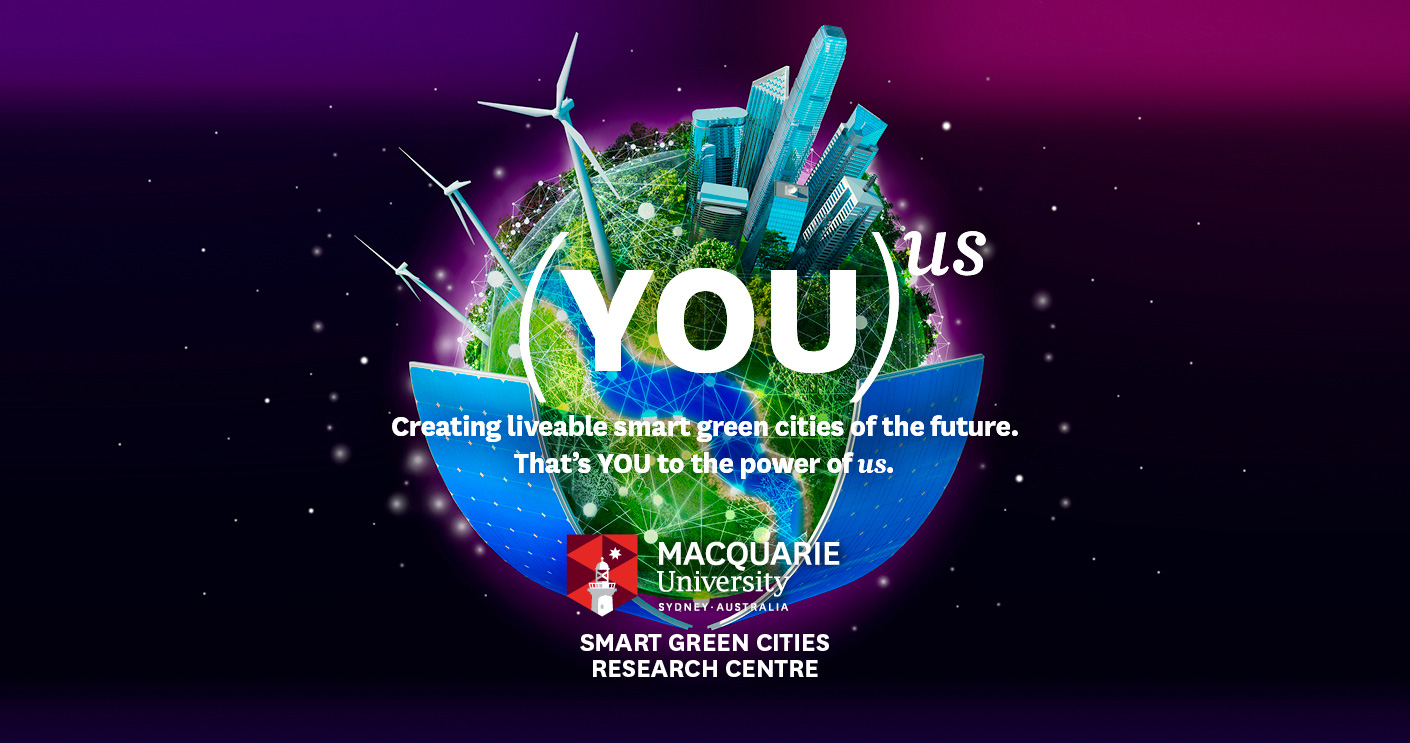The world is becoming increasingly urbanised. It is estimated that by 2050, two-thirds of the globe’s 10 billion people will live in an urban area. Cities currently cover less than 2 per cent of Earth’s surface yet account for 78 per cent of global energy use, 60 per cent of global greenhouse gas emissions and 70 per cent of global waste. Consequently, cities must be at the forefront of the transformation needed to combat and adapt to climate change globally. But our cities globally face enormous challenges, including air and water pollution, additional heat from the urban heat island effect, declining human health and loss of biodiversity. And increasingly our cities are exposed to the impacts of climate change, including extreme heat and flooding.
The Macquarie University Smart Green Cities Research Centre was formed to address these challenges with the objective to create collaborative evidence-based solutions for liveable smart green cities of the future.
Centre expertise
The Centre is hosted by the Faculty of Science and Engineering and brings together more than 45 academics from across all four faculties with combined expertise in urban ecology and biodiversity, climate change adaptation, environmental science, remote sensing, sensor development, energy, the Internet of Things, data analytics, sustainability, health and wellbeing, urban planning, governance, finance, strata and community title.
Research themes
Green and blue infrastructure – urban greening (including waterways) and biodiversity, climate-smart species selection and urban cooling, engineering solutions to enhance coastal biodiversity and smart urban forest management.
Smart technologies – sensor development and Internet of Things for mobility, health and energy optimisation, remote sensing, data privacy and security and data analytics.
Sustainable cities – sustainable urban design and planning, renewable energy solutions, circular economy principles, health and wellbeing, nature connection and sustainable development goals (SDG) initiatives.
Centre leadership
Distinguished Professor Michelle Leishman, School of Natural Sciences; Professor Michael Sheng, School of Computing; Professor Darren Bagnall, School of Engineering; Associate Professor Melanie Bishop, School of Natural Sciences; Associate Professor Peter Davies, School of Natural Sciences; Associate Professor Noushin Nasiri, School of Engineering; Dr Rohan Best, Department of Economics; Dr Sara Deilami, School of Engineering; Professor Maria Kangas, School of Psychological Sciences; Dr Caragh Threlfall, School of Natural Sciences and Professor Cathy Sherry, Macquarie Law School.
Key partners
The Centre partners with industry and government to develop evidence-based solutions that address global urban environmental challenges. Key partners include NSW Department of Planning and Environment, Sydney Water, Hort Innovation, NSW Smart Sensing Network, Snowy Hydro and Transport for NSW. The Centre has on-ground experimental and demonstration sites at The Australian Botanic Garden Mount Annan, and the living seawalls around Sydney Harbour.
Current projects include:
The Living Seawalls project aims to improve biodiversity in urban marine environments through co-design of marine built structures for humans and nature.
Read more in The Lighthouse: Two year study shows living seawalls promote regeneration in Sydney Harbour
Which Plant Where is the culmination of five years of research to facilitate resilient urban green spaces, including a world-first species selection tool for urban greening and analysis of ecosystem services.
Read more in The Lighthouse: Future city liveability to depend on which plant we put where
How to engage with the Smart Green Cities Research Centre
Staff and students interested in contributing to the works of the Centre are invited to contact the Executive Officer Leanne Price at smartgreencities@mq.edu.au
Upcoming events
Wednesday 26 July | Macquarie University City Campus
Together with Macquarie University’s Transforming Energy Markets Research Centre, Smart Green Cities will host University of Oxford Professor Myles Allen on 26 July. Professor Allen is the Director of the Oxford Net Zero initiative and will present ‘Geological Net Zero: How we will stop fossil fuels from causing global warming’, followed by a panel discussion with leading energy experts on ‘What does Net Zero mean for Australian energy markets?’
Check the Smart Green Cities webpage for registration details.


 Back to homepage
Back to homepage